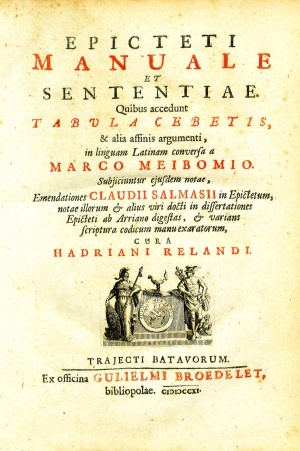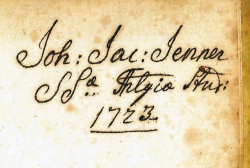Difference between revisions of "Epicteti Manuale et Sententiae"
| Line 1: | Line 1: | ||
| − | {{DISPLAYTITLE:''Epicteti Manuale et Sententiae: Quibus Accedunt Tabula Cebetis, & Alia Affinis Argumenti, in Linguam Latinam Conversa A Marco Meibomio | + | {{DISPLAYTITLE:''Epicteti Manuale et Sententiae: Quibus Accedunt Tabula Cebetis, & Alia Affinis Argumenti, in Linguam Latinam Conversa A Marco Meibomio''}} |
===by Epictetus=== | ===by Epictetus=== | ||
__NOTOC__ | __NOTOC__ | ||
| Line 13: | Line 13: | ||
|pages=[20], 151 [1], 124, 152, [59] | |pages=[20], 151 [1], 124, 152, [59] | ||
|desc=4to (21 cm.) | |desc=4to (21 cm.) | ||
| + | |shelf=H-2 | ||
}}[http://en.wikipedia.org/wiki/Epictetus Epictetus](55–135) was an ancient Greek Stoic philosopher. Spending his early years as a slave in Rome, Epictetus developed a philosophy of acceptance of fate. He believed that many people were dissatisfied with the world because they attempted to dominate aspects of life they had no ability to control.<ref>"[http://www.egs.edu/library/epictetus/biography/ Epictetus-biography]," The European Graduate School website, last modified October 22, 2013.</ref> “The things in our control are by nature free, unrestrained, unhindered; but those not in our control are weak, slavish, restrained, belonging to others. Remember, then, that if you suppose that things which are slavish by nature are also free, and that what belongs to others is your own, that you will be hindered. You will lament, you will be disturbed, and you will fault both gods and men.”<ref>"[http://classics.mit.edu/Epictetus/epicench.html The Enchiridion]," ''The Internet Classics Archive'', 1994-2009.</ref> This text is written in both Latin and Greek and may have been used as a teaching device for young students of those languages. | }}[http://en.wikipedia.org/wiki/Epictetus Epictetus](55–135) was an ancient Greek Stoic philosopher. Spending his early years as a slave in Rome, Epictetus developed a philosophy of acceptance of fate. He believed that many people were dissatisfied with the world because they attempted to dominate aspects of life they had no ability to control.<ref>"[http://www.egs.edu/library/epictetus/biography/ Epictetus-biography]," The European Graduate School website, last modified October 22, 2013.</ref> “The things in our control are by nature free, unrestrained, unhindered; but those not in our control are weak, slavish, restrained, belonging to others. Remember, then, that if you suppose that things which are slavish by nature are also free, and that what belongs to others is your own, that you will be hindered. You will lament, you will be disturbed, and you will fault both gods and men.”<ref>"[http://classics.mit.edu/Epictetus/epicench.html The Enchiridion]," ''The Internet Classics Archive'', 1994-2009.</ref> This text is written in both Latin and Greek and may have been used as a teaching device for young students of those languages. | ||
[[File:EpictetusEpictetiManualeEtSententiae1711Headpiece.jpg|left|thumb|350px|<center>Head-piece, first page of Greek text.</center>]] | [[File:EpictetusEpictetiManualeEtSententiae1711Headpiece.jpg|left|thumb|350px|<center>Head-piece, first page of Greek text.</center>]] | ||
| Line 22: | Line 23: | ||
View the record for this book in [https://catalog.swem.wm.edu/law/Record/3630041 William and Mary's online catalog]. | View the record for this book in [https://catalog.swem.wm.edu/law/Record/3630041 William and Mary's online catalog]. | ||
| + | |||
| + | ==See also== | ||
| + | *[[George Wythe Room]] | ||
| + | *[[Wythe's Library]] | ||
==References== | ==References== | ||
Revision as of 11:44, 4 September 2015
by Epictetus
| Epicteti Manuale et Sententiae | |
|
Title page from Epicteti Manuale et Sententiae, George Wythe Collection, Wolf Law Library, College of William & Mary. | |
| Author | Epictetus |
| Published | Trajecti Batavorum (Utrecht): Ex officina Guilielmi Broedelet |
| Date | 1711 |
| Language | Greek and Latin on opposite pages |
| Pages | [20], 151 [1], 124, 152, [59] |
| Desc. | 4to (21 cm.) |
| Location | Shelf H-2 |
Epictetus(55–135) was an ancient Greek Stoic philosopher. Spending his early years as a slave in Rome, Epictetus developed a philosophy of acceptance of fate. He believed that many people were dissatisfied with the world because they attempted to dominate aspects of life they had no ability to control.[1] “The things in our control are by nature free, unrestrained, unhindered; but those not in our control are weak, slavish, restrained, belonging to others. Remember, then, that if you suppose that things which are slavish by nature are also free, and that what belongs to others is your own, that you will be hindered. You will lament, you will be disturbed, and you will fault both gods and men.”[2] This text is written in both Latin and Greek and may have been used as a teaching device for young students of those languages.
Evidence for Inclusion in Wythe's Library
Thomas Jefferson listed Epicteti Manuel Gt. Lat. 4to. in his inventory of Wythe's Library, noting that he kept the volume himself. He later sold it to the Library of Congress but the copy no longer exists.[3] Brown's Bibliography[4] includes the 1711 edition as mentioned in Sowerby's Catalogue of the Library of Thomas Jefferson while George Wythe's Library[5] on LibraryThing indicates "precise edition unknown." The Wolf Law Library purchased the 1711 edition as suggested by Brown.
Description of the Wolf Law Library's copy
Bound in contemporary full vellum. Previous owner's inscription, "Joh. Jac. Jenner, ... 1723," on front free endpaper.
View the record for this book in William and Mary's online catalog.
See also
References
- ↑ "Epictetus-biography," The European Graduate School website, last modified October 22, 2013.
- ↑ "The Enchiridion," The Internet Classics Archive, 1994-2009.
- ↑ E. Millicent Sowerby, Catalogue of the Library of Thomas Jefferson, 2nd ed. (Charlottesville: University Press of Virginia, 1983), 2:28 [no.1299].
- ↑ Bennie Brown, "The Library of George Wythe of Williamsburg and Richmond," (unpublished manuscript, May, 2012) Microsoft Word file. Earlier edition available at: https://digitalarchive.wm.edu/handle/10288/13433
- ↑ LibraryThing, s. v. "Member: George Wythe," accessed on June 28, 2013.
External Links
Read the record for this book in Google Books.


